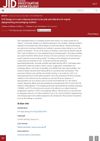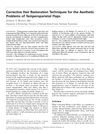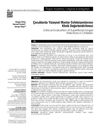Search
forProducts matching "topical caffeine serum"
Tracking 1 products like 285 Multi-Peptide Serum for Hair Density from by companies like Amazon. View product »
Sort by
Research
240-270 / 1000+ results
research Fluridil, a Rationally Designed Topical Agent for Androgenetic Alopecia
Fluridil safely promotes hair growth in men with androgenetic alopecia.

research Androgens and Acne: Perspectives on Clascoterone, the First Topical Androgen Receptor Antagonist
Clascoterone is a new, effective, and safe acne treatment without systemic side effects.

research The Effect of Experimental Hypothyroidism on the Skin of Adult Male Albino Rats and the Therapeutic Role of Topical Triiodothyronine
Hypothyroidism harms rat skin, but topical triiodothyronine may help improve it.

research Design of a New Molecule Proven to Be Safe and Effective for Topical Depigmenting and Antiaging Method
A new molecule was found to be a safe and effective skin lightener and anti-aging product.

research Nanostructured Lipid Carriers Loaded with an Association of Minoxidil and Latanoprost for Targeted Topical Therapy of Alopecia
The new treatment using tiny lipid carriers to deliver minoxidil and latanoprost directly to hair follicles shows promise for alopecia.
research Efficacy of Platelet-Rich Plasma Injections vs. Topical Minoxidil in Androgenic Alopecia

research Circumscribed Juvenile Pityriasis Rubra Pilaris in a 5-Year-Old Girl Treated with Topical Keratolytic and Steroid
A 5-year-old girl with a rare skin disorder was effectively treated with skin creams instead of oral medication.
research Immunomorphological Features of Female Patient’s Skin with Androgenetic Alopecia in the Treatment of Platelet-Rich Plasma in Combination with Topical Minoxidil 2% Lotion
The combined treatment improved scalp health in women with early-stage hair loss.

research A Review of Diagnosis and Treatment of Acne in Adult Female Patients
Adult female acne treatment should be personalized, considering individual preferences and pregnancy, using various topical and oral medications while managing side effects and resistance.

research Human Hair Follicle: Reservoir Function and Selective Targeting
The human hair follicle can store topical compounds and be targeted for drug delivery with minimal side effects.

research Management of Acne
Acne treatment varies, with topical and systemic therapies effective, and more research needed on treatment order and long-term effects.
research Dermal Delivery of Topically Applied Oligonucleotides via Follicular Transport in Mouse Skin
Topical oligonucleotide therapy targets hair follicles effectively.
research Lichen Spinulosus: Case Report and Review of Literature
A 12-year-old boy's rare skin condition improved with topical treatments and may resolve by puberty.

research Pattern Alopecia During Hormonal Anticancer Therapy in Patients with Breast Cancer
Some breast cancer patients on hormonal therapy may develop male or female pattern hair loss, which can sometimes be improved with topical treatments.

research Erosive Pustulosis of the Scalp: 3 Cases
Oral zinc and topical steroids can effectively treat chronic scalp pustules and hair loss in elderly patients.

research Corrective Hair Restoration Techniques for Aesthetic Problems of Temporoparietal Flaps
Dr. Dominic A. Brandy developed successful techniques to fix unnatural looks caused by old hair restoration methods, and using oral finasteride and topical minoxidil can help control hair loss in most men.

research Telogen Effluvium Revisited: A 2014 Review
Hair loss in Telogen effluvium is often chronic, linked to stress, and lacks a confirmed treatment, but topical corticosteroids may be used.

research Melatonin in the Topical Treatment of Androgenetic Alopecia
Topical melatonin is a safe treatment that may reduce hair loss in people with androgenetic alopecia.

research Prescribing Habits for Androgenic Alopecia Among Dermatologists in Spain in 2019–2020: A Cross-Sectional Study
In Spain, dermatologists most commonly prescribe topical minoxidil and oral finasteride for male hair loss, and topical minoxidil and oral contraceptives for female hair loss. The use of oral dutasteride and oral minoxidil has significantly increased over the past three years.
research A Retrospective Study on Alopecia Areata in Children: Clinical Characteristics and Treatment Choices
Alopecia areata in children is usually mild and effectively treated with strong topical steroids.

research Proceedings of the 7th World Congress of Hair Research
The conference discussed various hair disorders and treatments, including the use of topical steroids, high doses of cetrizine, and hair grafting, as well as the psychological impact of hair loss.
research Penetration And Distribution In Human Skin Focusing On The Hair Follicle
Topical drugs can target hair follicles to treat skin conditions more effectively.

research Androgenic Alopecia in a Patient With Systemic Lupus Erythematosus
The patient with lupus and hair loss improved with oral and topical minoxidil.

research Response to 'Vitamin D Status in Scarring and Nonscarring Alopecia'
The document suggests using a topical Vitamin D treatment for hair loss rather than oral supplements and calls for more research.
research Trachyonychia with Juvenile Pityriasis Rubra Pilaris
A young boy with a rare skin and nail condition improved significantly with simple topical treatments.

research Treatment of Post-COVID-19 Telogen Effluvium
Topical Minoxidil is effective for hair loss after COVID-19.
research Prenatal Diagnosis of a Fetus with Partial Monosomy 4p and Partial Trisomy 13q
Topical corticosteroids are the best initial treatment for children with Alopecia Areata.

research Clinical Evaluation of Superficial Fungal Infections in Children
The study found that scalp ringworm is the most common fungal infection in children and topical treatments work well.

research The Role of Mimicking Growth Factors to Control Anagen Phase: Evaluation In Vitro and In Vivo
Mimicking growth factors in a topical solution can prolong hair growth phase and reduce hair loss without side effects.